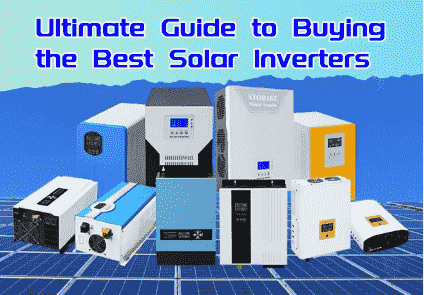
Grid-connected solar systems are becoming increasingly popular for their efficiency and cost savings. At the heart of every grid solar plant is the inverter, which plays a critical role in determining the performance, reliability, and profitability of your system.
This guide explores the importance of choosing right inverter; essential factors to consider while choosing the inverter; its impact on solar plant performance and how to evaluate the inverter on that parameter.
At the end we have also summarized the top international inverter manufacturers to help you make an informed decision.
Importance of Inverter Quality in Solar Plant Performance
Impact of Inverter Breakdowns on Profitability
Inverter failures account for 35-50% of solar plant breakdowns.
Inverter-related inefficiencies contribute to 15-25% of total energy losses.
Why High-Quality Inverters Matter
Reduced downtime and maintenance costs.
Better energy conversion efficiency ensures higher returns on investment.
Longer lifespan minimizes replacement expenses.
Key Factors to Consider When Choosing an On-Grid Solar Inverter

1. Efficiency and Power Conversion
Impact on Performance: High efficiency ensures minimal energy loss during the DC-to-AC conversion, maximizing the overall energy output.
How to Evaluate: Look for an efficiency rating above 95% and check for Maximum Power Point Tracking (MPPT) technology for optimal energy harvesting.
2. Reliability and Durability
Impact on Performance: A reliable inverter minimizes downtime and ensures consistent performance over its lifespan.
- How to Evaluate: Choose inverters with a 5-10 year warranty and robust designs that withstand extreme environmental conditions.
3. Heat and Noise Management
Impact on Performance: Efficient heat dissipation and low noise levels enhance performance and suitability for residential use.
How to Evaluate: Opt for inverters with advanced cooling systems and noise levels below 40 dB.
4. MPPT Technology
Impact on Performance: MPPT maximizes energy output, especially in varied sunlight conditions.
- How to Evaluate: Select inverters with multiple MPPT channels for installations with diverse panel orientations or shading.
5. Grid Compliance and Certification
Impact on Performance: Ensures seamless integration with the utility grid and adherence to safety standards.
- How to Evaluate: Verify certifications such as UL, IEC, or region-specific standards.
6. Warranty and Customer Support
Impact on Performance: Longer warranties indicate product confidence, while robust customer support ensures minimal downtime.
How to Evaluate: Prioritize inverters with 5-10 year warranties and accessible customer support services.
7. Performance in Real-World Conditions
Impact on Performance: High-quality inverters handle extreme conditions effectively, ensuring reliable energy production.
How to Evaluate: Check operational specifications like temperature ranges and performance during partial shading.
8. Safety Features
Impact on Performance: Advanced safety mechanisms reduce risks and protect the system from electrical faults.
- How to Evaluate: Look for features like overvoltage protection, short-circuit protection, and anti-islanding.
9. Size and Installation Flexibility
Impact on Performance: Compact designs and flexible mounting options simplify installation and space management.
How to Evaluate: Assess physical dimensions, weight, and weather resistance (IP rating).
10. Cost and Value
Impact on Performance: While upfront costs are important, long-term savings from better efficiency and durability matter more.
How to Evaluate: Compare lifetime costs, including efficiency, maintenance, and replacement expenses.
Top Tier 1, On-Grid Inverter Manufacturers

Leading Brands:
Sungrow (China)
Huawei (China)
Fronius (Austria)
SMA Solar (Germany)
Delta Electronics (Taiwan):
Enphase Energy (USA):
SolarEdge (Israel):
GoodWe (China):
Ginlong Solis (China)
ABB (FIMER) (Switzerland/Italy)
Conclusion
Choosing the right inverter is pivotal to maximizing the performance, efficiency, and profitability of your solar power system. By focusing on key factors such as efficiency, durability, cooling systems, and grid compliance, you can ensure long-term success and energy savings. While premium inverters may have a higher upfront cost, their superior reliability and efficiency make them a worthwhile investment for sustainable energy solutions.

